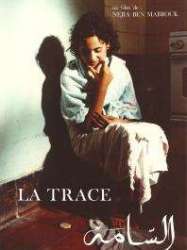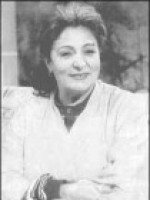Néjia Ben Mabrouk is a Director and Scriptwriter born on 1 july 1949

Néjia Ben Mabrouk (born 1 July 1949) is a Tunisian screenwriter and the director of Sama.
At that time I didn't want to make my own films, perhaps because there were no role models of women as filmmakers. All the directors were men; for me as a young woman, therefore, the more obvious choice was to tell stories through writing. I dreamed of writing novels.
During her college years, Ben Mabrouk first studied French at Tunis University, but had to leave after a few semesters for financial reasons. She began studying filmmaking at INSAS in 1972 at Brussels. Her film education was largely built on critical documentary film. She wrote and directed the film At Your Service for her graduation project in 1976, and then worked as a trainee for RTBF.
From 1979 to 1980, Ben Mabrouk started writing the script for her first full-length feature, Sama (The Trace). The film was finished in 1982, but a dispute with the production company SATPEC delayed the film's release until 1988. Sama won the Caligari Prize at the 1989 Berlin International Film Festival. Containing autobiographical elements from Ben Mabrouk's life, Sama tells the story of Sabra, a young Tunisian girl seeking an education, which she eventually finds, exiled in Europe.
She wrote and directed a fifteen-minute segment titled "In Search of Chaima" for the documentary The Gulf War... What Next? (1991), investigating the impact of war on women and children. She has written the screenplay for her second full-length feature, titled Nuit à Tunis (Night in Tunis).
Source : Wikidata
Néjia Ben Mabrouk

- Infos
- Photos
- Best films
- Family
- Characters
- Awards
Birth 1 july 1949 (74 years)
Biography
Ben Mabrouk was born at El Oudiane, Tunisia, in 1949 and attended boarding school at Sfax. At a young age, she became familiar with European cinema and joined the local film club. Concerning her career plans growing up, she explains:At that time I didn't want to make my own films, perhaps because there were no role models of women as filmmakers. All the directors were men; for me as a young woman, therefore, the more obvious choice was to tell stories through writing. I dreamed of writing novels.
During her college years, Ben Mabrouk first studied French at Tunis University, but had to leave after a few semesters for financial reasons. She began studying filmmaking at INSAS in 1972 at Brussels. Her film education was largely built on critical documentary film. She wrote and directed the film At Your Service for her graduation project in 1976, and then worked as a trainee for RTBF.
From 1979 to 1980, Ben Mabrouk started writing the script for her first full-length feature, Sama (The Trace). The film was finished in 1982, but a dispute with the production company SATPEC delayed the film's release until 1988. Sama won the Caligari Prize at the 1989 Berlin International Film Festival. Containing autobiographical elements from Ben Mabrouk's life, Sama tells the story of Sabra, a young Tunisian girl seeking an education, which she eventually finds, exiled in Europe.
She wrote and directed a fifteen-minute segment titled "In Search of Chaima" for the documentary The Gulf War... What Next? (1991), investigating the impact of war on women and children. She has written the screenplay for her second full-length feature, titled Nuit à Tunis (Night in Tunis).
Usually with
Filmography of Néjia Ben Mabrouk (1 films)
Director

The Trace (1988)
, 1h30Directed by Néjia Ben Mabrouk
Genres Drama
Themes Films set in Africa, Feminist films, Political films
Actors Mouna Noureddine
Rating77%





The mother (Mouna Noureddine) of gives her daughter Sabra (Fatma Khemiri) an oval stone to protect her from men until her wedding day. The mother keeps the stone locked in a jewelry box, symbolizing Sabra being locked in society against her consent. Living in the male-dominated Tunisian society, Sabra seeks an education in fear of being reduced to society's traditional roles. Flashbacks to her childhood reveal how her mother taught her to be wary of men. After fighting her way past societal barriers, Sabra makes it into university and studies for her exams by candlelight. However, when her professor gives her a failing grade, Sabra decides that she has to leave. Using her mother's support, Sabra continues her studies exiled in Europe.
Scriptwriter

The Trace (1988)
, 1h30Directed by Néjia Ben Mabrouk
Genres Drama
Themes Films set in Africa, Feminist films, Political films
Actors Mouna Noureddine
Roles Writer
Rating77%





The mother (Mouna Noureddine) of gives her daughter Sabra (Fatma Khemiri) an oval stone to protect her from men until her wedding day. The mother keeps the stone locked in a jewelry box, symbolizing Sabra being locked in society against her consent. Living in the male-dominated Tunisian society, Sabra seeks an education in fear of being reduced to society's traditional roles. Flashbacks to her childhood reveal how her mother taught her to be wary of men. After fighting her way past societal barriers, Sabra makes it into university and studies for her exams by candlelight. However, when her professor gives her a failing grade, Sabra decides that she has to leave. Using her mother's support, Sabra continues her studies exiled in Europe.
 Connection
Connection
